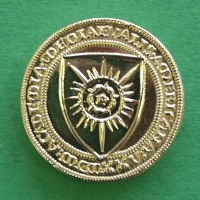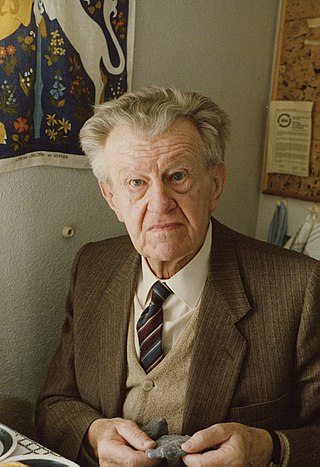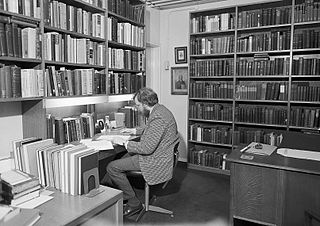Related Research Articles
David Louis Goodstein was an American physicist and educator. From 1988 to 2007 he served as Vice-provost of the California Institute of Technology (Caltech), where he was also a professor of physics and applied physics, as well as the Frank J. Gilloon Distinguished Teaching and Service Professor.

William Henry Welch was an American physician, pathologist, bacteriologist, and medical-school administrator. He was one of the "Big Four" founding professors at the Johns Hopkins Hospital. He was the first dean of the Johns Hopkins School of Medicine and was also the founder of the Johns Hopkins School of Hygiene and Public Health, the first school of public health in the country. Welch was more known for his cogent summations of current scientific work, than his own scientific research. The Johns Hopkins medical school library is also named after Welch. In his lifetime, he was called the "Dean of American Medicine" and received various awards and honors throughout his lifetime and posthumously.

Colonel Fielding Hudson Garrison, MD was an acclaimed medical historian, bibliographer, and librarian of medicine. Garrison's An Introduction to the History of Medicine (1913) is a landmark text in this field.

Owsei Temkin was William H. Welch Professor Emeritus of the History of Medicine at Johns Hopkins University. He was a Russian-born, German-educated, American medical historian.
The Pfizer Award is awarded annually by the History of Science Society "in recognition of an outstanding book dealing with the history of science"
Charles Coulston Gillispie was an American historian of science. He was the Dayton-Stockton Professor of History of Science, Emeritus at Princeton University. He was succeeded by Arno J. Mayer.

Karl Sudhoff was a German historian of medicine, helping establish that field as a legitimate discipline for research and teaching within faculties of medicine.
The Messenger Lectures are a series of talks given by scholars and public figures at Cornell University. They were funded in 1924 by a gift from Hiram Messenger of "a fund to provide a course of lectures on the Evolution of Civilization for the special purpose of raising the moral standard of our political, business, and social life", to be "delivered by the ablest non-resident lecturer or lecturers obtainable". The lecture series has been described as one of Cornell's most important of extracurricular activities.

The Haskins Medal is an annual medal awarded by the Medieval Academy of America. It is awarded for the production of a distinguished book in the field of medieval studies.

Henry Ernest Sigerist was a Swiss medical historian and proponent of universal health care.

Erwin Heinz Ackerknecht was an active and influential Trotskyist in the 1930s who had to flee Germany in 1933 after Hitler’s rise to power. It was in the United States, the country that granted him citizenship, that Ackerknecht became an influential historian of medicine. He wrote groundbreaking works on the social and ecological dimensions of disease and was a forerunner of contemporary trends in social and cultural history. He became the first Chair in the history of medicine at the University of Wisconsin; the second such position in the United States.
Warwick Hugh Anderson, medical doctor, poet, and historian, is Janet Dora Hine Professor of Politics, Governance and Ethics in the Discipline of Anthropology, School of Social and Political Sciences, and in the Charles Perkins Centre, University of Sydney, where he was previously an Australian Research Council Laureate Fellow (2012–17). He is also honorary professor in the School of Population and Global Health, University of Melbourne. He is a fellow of the Australian Academy of the Humanities, the Academy of Social Sciences in Australia, the Australian Academy of Health and Medical Sciences and the Royal Society of New South Wales, from which he received the History and Philosophy of Science Medal in 2015. For the 2018–19 academic year, Anderson was the Gough Whitlam and Malcolm Fraser Chair of Australian Studies at Harvard University, based in the History of Science Department.

William Frederick Bynum is a British emeritus professor in history of medicine. For most of his career, he has worked at the Wellcome Trust Centre for the History of Medicine, University College London (UCL).
David C. Cassidy is an American historian of science and professor emeritus at Hofstra University, Hempstead, New York. He is best known for his contributions to the history of quantum mechanics, scientific biography, history of physics in Germany and the United States and, most recently, science-history drama.

Barbara H. Stein was a scholar and bibliographer of Latin American and Iberia at the Princeton University Library. She and her husband Stanley J. Stein published works on Spain and Spanish America, analyzing the rise and fall of the Spanish Empire. Stein was honored with the American Historical Association’s Award for Scholarly Distinction in 1996, recognizing her career contributions to Iberian and Spanish American history. In 2018, Princeton University acquired a valuable collection of Brazilian manuscripts. "The acquisition honors Stanley and Barbara Stein's contributions to the library's Latin American collections and to Latin American studies at Princeton."
Richard Harrison Shryock was an American medical historian, specializing in the connection of medical history with general history.
Israel E. Drabkin was an American classicist and historian of science, medicine, and mathematics. He spent much of his career at the City College of New York. He is known for his studies of Caelius Aurelianus and Galileo.
Saul Wallenstein Jarcho, M.D. was an American internist and historian of medicine. He is known for the eponymous Jarcho-Levin syndrome and, to a much lesser extent, Jarcho's syndrome.
Lester Snow King, M.D. was an American pathologist, medical editor, medical journalist, and medical historian.
Genevieve Miller was an American medical historian and medical museum curator and director.
References
- 1 2 "William H. Welch Medal | American Association for the History of Medicine".
- ↑ In honour of William H. Welch. Lord Baltimore Press. 1910.
- ↑ Brown, T. M.; Fee, E. (2003). "Henry E. Sigerist: Medical Historian and Social Visionary". American Journal of Public Health. 93 (1): 60. doi:10.2105/ajph.93.1.60. PMC 1447692 . PMID 12511386.
- ↑ "Welch Medal Winners | American Association for the History of Medicine".
- ↑ Miller, Genevieve (1976). "The missing seal, or highlights of the first half century of the American Association for the History of Medicine". Bulletin of the History of Medicine. 50 (1): 93–121. JSTOR 44450316. PMID 769878.